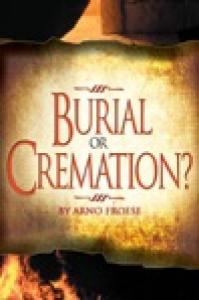Description
The practice of cremation is rarely discussed publicly within the Church, although this alternative to burial has become a modern-day phenomenon. More and more people have chosen to have their remains cremated; therefore, the issue must be dealt with regardless of its sensitive nature. We will consider the differences between burial and cremation in this short examination, and use the Bible as our only reliable source. First, I must point out that the method in which a person chooses to dispose of his or her body at death has no direct relationship to their salvation. Nor am I questioning God’s ability to raise the dead from dust or from ashes. I am, however, obligated to challenge believers to examine what Scripture says regarding the biblical ordination for disposing of a person’s body. Fire Judgment We read on several occasions in Scripture that fire came down from heaven as a form of judgment to destroy the opposition (Genesis 19:24; Exodus 9:23; Leviticus 10:2; Numbers 11:1, 16:35). God threatened the godless people with fiery judgment (Jeremiah 17:27; Hosea 8:14; Amos 7:4). The Lord’s displeasure with cremation is clearly expressed in Amos 2:1: “Thus saith the LORD; For three transgressions of Moab, and for four, I will not turn away the punishment thereof; because he burned the bones of the king of Edom into lime.” When Israel fell into idolatry, the people used fire to sacrifice their sons and daughters to the demon god Molech (Deuteronomy 12:31; 2 Kings 16:3, 17:17, 21:6, 23:10; Ezekiel 20:31). These examples provide evidence that Scripture does not endorse cremation of the body. Practice of Burial We can begin with Abraham, the father of all believers, and follow the accounts of each person mentioned in Scripture thereafter, and will not find one who was deliberately burned after they died. King David, a man according to the heart of God, died and was buried: “So David slept with his fathers, and was buried in the city of David” (1 Kings 2:10). In the New Testament, we read about the way in which John the Baptist’s body was handled: “And his disciples came, and took up the body, and buried it, and went and told Jesus” (Matthew 14:12). Jesus prophesied about His burial after an unnamed woman poured precious ointment upon His head, “She hath done what she could: she is come aforehand to anoint my body to the burying” (Mark 14:8). Jesus was not cremated when He died, “And when Joseph had taken the body, he wrapped it in a clean linen cloth, and laid it in his own new tomb,




